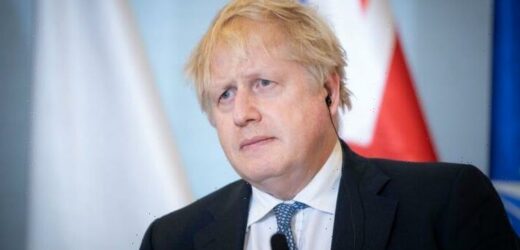Ruth Davidson questions Boris Johnson’s ‘integrity’
We use your sign-up to provide content in ways you’ve consented to and to improve our understanding of you. This may include adverts from us and 3rd parties based on our understanding. You can unsubscribe at any time. More info
Experts have warned that Britain may have to import up to three-quarters of its gas by 2030. And this could even surge from 70 to 80 percent 10 years later, and could even soar to 85 percent by 2050. The analysis by the Financial Times was based on the Oil and Gas Authority’s projections and estimates from the Climate Change Committee. As the UK plans to race to net zero, an important part of Mr Johnson’s “Ten-Point-Plan” to invigorate a green industrial revolution is to switch to renewable energy and decrease reliance on fossil fuels.
Mr Johnson has even said he wants UK energy production to be 100 percent green by 2035.
He has said: “Potentially we think we can get to complete clean energy production by 2035.”
And lessening the dependency on gas to provide Britain’s energy is set to play a key role in doing so.
Mr Johnson has claimed: “It will mean that for the first time the UK is not dependent on hydrocarbons coming from overseas, with all the vagaries in hydrocarbon prices and the risks that poses for people’s pockets.
“The consumer will be reliant on our own, clean power generation which will help us also to keep costs down.”


But, according to the analysis, this could backfire and send the UK’s dependency on foreign gas soaring higher
The projections have sparked outrage amongst the public.
Henry Miller wrote on Twitter: “Why is the gas from Russia, America and the Middle East environmentally friendly and ours must stay in the ground because it’s harmful?”
Adam Harris added: Imported energy prices are reaching a point where thousands of old people can’t afford heating.
Twitter user @SJT1958LUFC pointed out: “Why pick on the UK? We’ve reduced carbon emissions by 44 percent. Why not have a go at China?”

Currently, around half of UK gas comes from its domestic supply in the North Sea.
But it imports around a third of its gas from Norway.
Environmentalists are calling for North Sea oil projects to be scrapped.
Last year, a spokesman from Greenpeace UK said: “Both the Westminster and Scottish Government now need to end support for new oil and gas infrastructure.”
And this also comes after Shell pulled out of the Cambo oilfield back in December.
DON’T MISS
Putin strikes! Russia cuts gas supply after Biden’s troops make ‘de… [REPORT]
Biden humiliated as plan for EU backfires [INSIGHT]
UK in major breakthrough as it smashes records to use star energy [REVEAL]

But six North Sea projects were given approval in 2021, with an additional 10 awaiting approval in 2022.
While climate activists and environmentalists appear to staunchly oppose these projects, it has been argued that gas is still needed in gradual the transition to clean energy.
Energy Minister Greg Hands said: “Flicking a switch and turning off our domestic source of gas overnight would put energy security, British jobs and industries at risk and we would be even more dependent on imports.”
This also comes after Chancellor Rishi Sunak reportedly asked Business Secretary Kwasi Kwarteng for the licenses of six oil and gas fields to be fast-tracked.

The North Sea spots need approval from Britain’s oil and gas regulator so construction can start.
The Telegraph reports that ministers have already dished out preliminary licenses.
The combined reserves of the six sites have 62 million tonnes of oil equivalent fuel which can reportedly power all of Britain for six months.
Mr Sunak said: “We have resources in the North Sea, and we want to encourage investment in that because we’re going to need ¬natural gas as part of our ¬transition to getting to net zero.”
Source: Read Full Article


